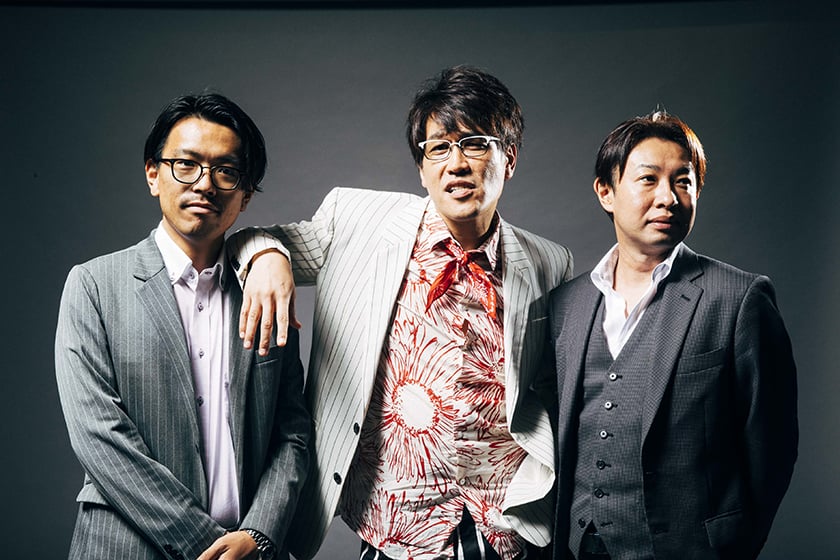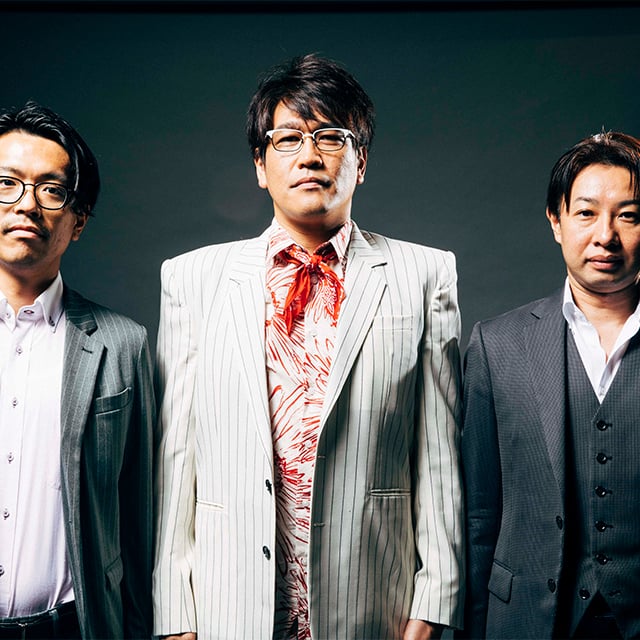Over 130 million views on YouTube, performances at the presidential dinner banquet attended by Trump and Abe, and the UN Headquarters in New York, elected as the tourist ambassador to Uganda... the list goes on. In August of 2016, one man named Pikotaro appeared in a video uploaded to YouTube titled PPAP (Pen-Pineapple-Apple-Pen), causing a world-wide craze overnight. Now, two years later, the performer/producer DAIMAOU KOSAKA, sits down with Terutomo Shiratori, a general manager of Avex Management and Chief Manager Masanori Arai, to talk about the birth of Pikotaro, some behind-the-scenes stories, and what made the phenomenon such a hit.

How the maverick trio first met
and why NO BOTTOM!
was ahead of its time

Soon after arriving for the interview, the first words out of Kosaka’s mouth were, “It’s his thirteenth year in Avex!” introducing his old friend Shiratori while taking a look back on the good ol’ days.
Kosaka “Teru and I, I call him Teru, we’ve been together since kindergarten. We went to the same elementary school too. Not the same high school though. When we turned eighteen we both moved to Tokyo. I became a comedian and Teru got employed. He did repairs on those machines in banks, like those change machines, you know. He did that until he was like, “I can’t make any more change!” haha. Then, when he was 26, he got interested in my industry and decided to change careers.”
Shiratori “Kosaka didn’t have a manager at the time and he asked me if I would like to meet the president of his agency. I went for an interview at the Italian Tomato, behind Shinjuku ALTA, and he told me he wanted me to come aboard right away. I didn’t know what to do at first because changing careers would have taken about three months. He said he would wait three months, and I thought, “Alright” and made up my mind.”

Kosaka and Shiratori have been friends forever. Nevertheless, something ate at Shiratori since their days back in their hometown of Aomori. “I was positive that Kosaka would be able to make it as a comedian, but I thought that if we tried doing it together, I’d just drag him down,” he said. It seems though, however, that back then, the chances of someone from the country side like Aomori becoming a comedian, were slim to none.
Kosaka “In those days, saying you were going to move to Tokyo to become a comedian was the same as saying you were moving to Hollywood to become an actor. When I first came to Tokyo, they had finally made JCA (a training school for comedians established by JINRIKISHA, the first in the Kanto region), but until that, you really had no choice but to enter NSC [of Yoshimoto Kogyo] in Osaka. There were other similar places like Nichigei (Nihon University College of Art) or Anagaku (Tokyo Announce Gakuin Performing Arts College), but I chose to go to Japan Institute of the Moving Image when I came to Tokyo, because Ucchan Nanchan graduated from there. My parents wouldn’t have allowed me to move here if I didn’t.”
Since Kosaka didn’t have a partner to work with at the time, he ended up creating Sokonuke AIR-LINE in 1991 with two of his class members, Kojima and Murashima, who sat in the back of the class. They first signed with M2 Company (the former name of the comedian production company HoriPro com). This is where they ran into Arai, who was a member of the unit Kutsushita Issoku Nisoku.

Arai “I was a college student before entering HoriPro. But I quit school because I was serious about becoming a comedian and started a team with my friends that I had gone to elementary school with. We went to countless auditions and flopped every time. We wound up signed with HoriPro but they had no way to use us at first. Shiratori wasn’t managing our team and was working with other comics. I did my best with comedy for five years, but I didn’t see it leading anywhere, so I quit. After that, I wanted to become a bodybuilder so I started working at a gym. I had really good muscular structure, haha. But about six months after that, Shiratori (who had switched over to Avex) called me out of nowhere and was like, “You interested in managing?” For someone like me, a tiny comedian, a big corporation like Avex was like, an unknown world.”
Shiratori “I was managing shows for [the pop group] AAA back then. I was running my butt off every day and was just looking for someone who could work politely [who knew the etiquettes of the industry] and who had a fighting spirit. That’s when I remembered Arai. HoriPro com only had one rehearsal hall at the time. First the senior comedians had dibs on it, and the younger comedians were allowed to use it after them. After the trains stopped running, it was basically always vacant, because no one would be able to get home. But I had noticed that Arai and his crew back then were coming to practice after everyone went home. I really took a liking to this fighting spirit he had, and that he didn’t mind putting in the effort.”
Kosaka “Around that time, I had started a techno unit called NO BOTTOM! Well, before that you should know that I didn’t enter Avex as a comedian. To put that in perspective, the DA BUBBLEGUM BROTHERS were a comic duo, but then they put out that song Won’t Be Long and they just flew past all the other comics, right? I thought that was pretty darn cool. I had always liked The Drifters and Tunnels too. I like people doing both comedy and music. The first time I was serious about doing music was with NO BOTTOM!.”
Around March of 2002, Kosaka made an appearance in the popular TV variety show Manee no Tora [No Challenge, No Success]. He aimed to use it as a platform to take his band to London for their major debut, but he was declined. After that, he would later have the opportunity to debut through the help of another show where he took festival music from festivals all throughout Japan and turned them into dance music. That label was Avex.
Kosaka “NO BOTTOM! finally got its major debut in 2004 thanks to Avex. My first solo performance was at Velfarre. I made some real out-there material, like mixing the Tokyo Ondo [festival song/dance] with Julianna’s Tokyo [Discotheque] to make the Julian’s Tokyo Ondo, or mixing Awa-odori [famous festival song/dance from Tokushima] with Underworld [the electronic group] to make the Undaawaald-odori, or mixing Lupin The Third [manga] with Morioka Sansa [festival song/dance] to make the Lupin Sansa, all kinds of stuff. I think I was really ahead of the game at the time, haha.”
Shiratori “I think it was a great idea, but it didn’t catch on. The internet wasn’t a thing like it is now. If they had SNS back then, there probably would’ve been a whole different outcome.”
The hidden “prep for demand”
that made Pikotaro a hit

SNS was an invaluable link in the puzzle that would later send Pikotaro and PPAP to world stardom. You could say that the trio - Kosaka, Shiratori and Arai - had been experimenting long before Pikotaro even came on the scene. Plus, the three really balanced each other out well.
Kosaka “I like to think that we have a lot of similarities, like really similar, but we’re completely different too. Shiratori is my manager, but before that we’re childhood friends. Arai is one of my juniors. There are good sides and bad to this kinda relationship, but I think the good sides really came through for us on Pikotaro.”
There was, however, a personal struggle going on within Kosaka up until the birth of Pikotaro. “If I do both comedy and music, but can only do it half-ass, then no is gonna acknowledge me.” says Kosaka. “I came to Tokyo after all to be a comedian.” He decided to do another solo performance in 2010. This was when comedy TV shows like Enta no kamisama [The God of Entertainment] and Red Carpet were the thing, and having a “short skit with strong characters” was the norm. Kosaka’s first skit, however, was forty minutes long. He wanted to “ignore TV,” and “go around and surprise ‘em from behind.” It was through these efforts that he developed Pikotaro.
Kosaka “I had been making music for so long, and I had done a music skit with NO BOTTOM! too. Even a music skit with Sokonuke AIR-LINE. But this time, I wanted “someone else” to do it, not me. When the offer came around for me to do my second solo performance, I had Pikotaro come on as a special guest. That was the beginning of it all. After that I used the song I had used in my skit Techno Gymnastics. I really wanted to use this song for a while so I handed it over to Pikotaro and made PPAP. Comedians have to have a punchline, but since he was a musician, he didn’t have to be funny.”

Shiratori and Arai watched the birth of Pikotaro from up close, but they didn’t give Kosaka their two sense about the idea while he was at it.
Arai “At first, Shiratori and I thought he should do Pikotaro with a different song. Because there were other good songs for it.”
Shiratori “Huh? You sure about that?”
Arai “Oh, you cheater...! haha.”
Kosaka “Well, see, including all of that, it was all luck. I think of Pikotaro being just one big pile of luck. I often compare it to winning the lottery 200,000 times. I mean, honestly speaking, it’s a one-hit-wonder kinda thing, right? But I still get offers from overseas and other gigs. But, in order to catch good luck, you have to grab for it countless times. Thinking about it now, I’ve been grabbing and trying my but off. All the while, I had been building a base around me with good reliable people, and I had gained the trust of people in the industry. I look at this as the my “prep for demand.”
Another factor that is often brought up when discussing Pikotaro’s hit PPAP, is the music quality. This is a part of the recipe that Kosaka had cleverly slipped into the pot, recognizing how “pop” of an icon Pikotaro was.
Kosaka “From a comedy standpoint, Pikotaro doesn’t hold much water. But when I talk to musicians, first they always talk about the track I use. DJ KOO was like, “that cowbell on the 808, that’s cheating man,” in a good way. Tofubeats said the same thing when he was on the TV show KanJam. I think that’s what really got it spreading overseas. I think a lot of people first heard it when Justin Bieber tweeted about it. In order for someone like him to say he liked it, it had to be good, musically. If Pikotaro only possessed elements often seen in Japanese comedy, it wouldn’t have been in demand overseas the way it was.”
Unstoppable Avex
and the Top-Down Trio

PPAP has been viewed over 130 million times. When you include the other versions to it, PPAP has been viewed over a whopping 400 million times.
Arai “At one point it started increasing by tens of millions, every hour. I thought that the account had been hacked or something.”
Kosaka “People often ask me if I “fully realize” the scale of its success, but that’s a real hard one. I mean, even music videos that people put a lot of hard work into, if they reach even just 100,000 views, its really something. But I have to admit that it really hits home when I travel abroad. Also, there were a lot of things I wouldn’t have been able to do if it weren’t for Avex. The easiest example I could give, would be, say, when something went wrong in another country. Also, the video was uploaded in August of 2016, it started going world-wide in October, and I made the album in December. This kinda speed is something you can only do with Avex behind you.”
Shiratori “This was the first time its happened for as long as I’ve been his manager, but when everyone started asking for Pikotaro all of a sudden, I had this flash, and I knew exactly what I wanted to do. The theme was to make a skit that dragged in and involved the whole world, haha. So we were talking about this and that, let’s do this, let’s not do that, let’s do this first, you know. And I told Kosaka my ideas, and we agreed that it would be the perfect timing to give back to all those who helped us out over the years, that we ought to make that a priority. And I told him that we were gonna be super busy, and not to complain about the schedule. Then he said in the end, “As long as it’s interesting, I’ll do it. So if we find ourselves not sure if we should do a gig or not, we base our decision on that, whether it’s ‘interesting’ or not.” I remember that very well. We never imagined we would become as busy as we did after that. I had my share of selfish requests to the company, but when we came together and pushed ahead tightknit, most of the things we wanted to do came true.”
Arai “I was taught that the manager had to manage the performer’s schedule in a way that didn’t put too much stress on their mind and body, but this time around, we were like “who cares!” Even on just two hours, or one hour of sleep, the jobsite was just so much fun, that we could just run with it. I had never experienced that before. Then things like Justin Bieber’s tweet happened, and it wakes you right up again. You’re like, “something’s gonna happen.” I was in contact with many people overseas as well, night and day.”

After Pikotaro’s world-wide hit, Shiratori and Arai received the company’s most honorable prize last year - the Mad+Pure Award.
Kosaka “I would’ve never thought my childhood friend and my junior would receive that award. Like I always say, we’re really lucky. Of course it was a buildup of a lot of preparation, ever since the thing started booming we were like, “So when is this thing gonna come to an end?” We were making new things, new side collaborations with it, but we saw it as something extra, like the bonus stage in Mario. But it was these two guys right here that made all that branding possible. Another thing I used to say in the early days was, “you see a lot of decisions being made top-down, but in this case, we were the top.”
Shiratori “Everyone in the company showed us a lot of support and respect. “You guys totally got this,” they’d say.”
Arai “It was a lot of fun, wasn't it?”
Kosaka “I think we all deserve an nearly perfect score on this one.”
Early this year, Pikotaro’s new song Can you see? I’m SUSHI was chosen to be the main featured song on the national broadcasting company NHK’s TV show Minna no Uta [Everyone’s Song]. In July, his first digital album I have a PPAP was streamed in 150 countries throughout the world. From the looks of it, Pikotaro’s hidden arsenal should still house many more ideas.
Kosaka “We still have many plans up our sleeves. Of course we don’t know whether they’ll hit the mark or not, but we’ll try our best. We plan to keep on moving. I should probably let you know now, nothing we do is gonna top the PPAP phenomenon, haha. So, we don’t even think about trying to outdo it, we’re just doing what seems interesting, that’s it.”
Lastly, when we asked Kosaka what he thinks is a signature characteristic of Avex, he answered, with a laugh, “These two guys here aren’t really the Avex type, so...” He went on to add, “But, after all, I’d have to say that Avex is unstoppable. They know how to win. When you throw something into an entity that knows how to win, you get nuclear fusion. And it’s turned into this really well constructed system. Pikotaro wouldn’t have gotten as much demand as it did if it weren’t for Avex.”
So what does the future hold for Pikotaro? One thing we must not forget, is that Pikotaro is just one producer/artist in DAIMAOU KOSAKA’s personal arsenal.

(Photo:Left)
Avex Management Inc.
Talent Management
Chief producer Masanori Arai
(Photo:Center)
DAIMAOU KOSAKA (Producer Pikotaro)
(Photo:Right)
Avex Management Inc.
Talent Management
General manager Terutomo Shiratori









